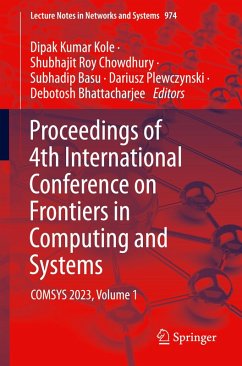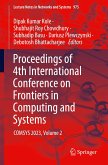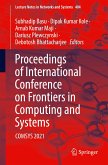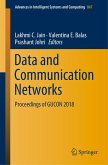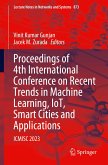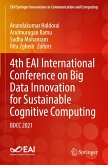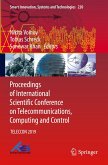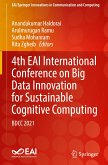Proceedings of 4th International Conference on Frontiers in Computing and Systems
COMSYS 2023, Volume 1
Herausgegeben:Kole, Dipak Kumar; Roy Chowdhury, Shubhajit; Basu, Subhadip; Plewczynski, Dariusz; Bhattacharjee, Debotosh
Proceedings of 4th International Conference on Frontiers in Computing and Systems
COMSYS 2023, Volume 1
Herausgegeben:Kole, Dipak Kumar; Roy Chowdhury, Shubhajit; Basu, Subhadip; Plewczynski, Dariusz; Bhattacharjee, Debotosh
- Broschiertes Buch
- Merkliste
- Auf die Merkliste
- Bewerten Bewerten
- Teilen
- Produkt teilen
- Produkterinnerung
- Produkterinnerung
This book gathers high-quality research papers presented at the 4th International Conference on Frontiers in Computing and Systems (COMSYS 2023) held at Indian Institute of Technology Mandi, Himachal Pradesh, India, during 16-17 October 2023. The book is divided into two volumes, and it covers research in "cyber-physical systems for real-life applications" pertaining to AI, machine learning and data science; devices, circuits, and systems; computational biology, biomedical informatics, and network medicine; communication networks, cloud computing, and IoT; image, video, and signal processing; and security and privacy. …mehr
Andere Kunden interessierten sich auch für
![Proceedings of 4th International Conference on Frontiers in Computing and Systems Proceedings of 4th International Conference on Frontiers in Computing and Systems]() Proceedings of 4th International Conference on Frontiers in Computing and Systems171,99 €
Proceedings of 4th International Conference on Frontiers in Computing and Systems171,99 €![Proceedings of International Conference on Frontiers in Computing and Systems Proceedings of International Conference on Frontiers in Computing and Systems]() Proceedings of International Conference on Frontiers in Computing and Systems169,99 €
Proceedings of International Conference on Frontiers in Computing and Systems169,99 €![Data and Communication Networks Data and Communication Networks]() Data and Communication Networks116,99 €
Data and Communication Networks116,99 €![Proceedings of 4th International Conference on Recent Trends in Machine Learning, IoT, Smart Cities and Applications Proceedings of 4th International Conference on Recent Trends in Machine Learning, IoT, Smart Cities and Applications]() Proceedings of 4th International Conference on Recent Trends in Machine Learning, IoT, Smart Cities and Applications171,99 €
Proceedings of 4th International Conference on Recent Trends in Machine Learning, IoT, Smart Cities and Applications171,99 €![4th EAI International Conference on Big Data Innovation for Sustainable Cognitive Computing 4th EAI International Conference on Big Data Innovation for Sustainable Cognitive Computing]() 4th EAI International Conference on Big Data Innovation for Sustainable Cognitive Computing116,99 €
4th EAI International Conference on Big Data Innovation for Sustainable Cognitive Computing116,99 €![Proceedings of International Scientific Conference on Telecommunications, Computing and Control Proceedings of International Scientific Conference on Telecommunications, Computing and Control]() Proceedings of International Scientific Conference on Telecommunications, Computing and Control216,99 €
Proceedings of International Scientific Conference on Telecommunications, Computing and Control216,99 €![4th EAI International Conference on Big Data Innovation for Sustainable Cognitive Computing 4th EAI International Conference on Big Data Innovation for Sustainable Cognitive Computing]() 4th EAI International Conference on Big Data Innovation for Sustainable Cognitive Computing116,99 €
4th EAI International Conference on Big Data Innovation for Sustainable Cognitive Computing116,99 €-
-
-
This book gathers high-quality research papers presented at the 4th International Conference on Frontiers in Computing and Systems (COMSYS 2023) held at Indian Institute of Technology Mandi, Himachal Pradesh, India, during 16-17 October 2023. The book is divided into two volumes, and it covers research in "cyber-physical systems for real-life applications" pertaining to AI, machine learning and data science; devices, circuits, and systems; computational biology, biomedical informatics, and network medicine; communication networks, cloud computing, and IoT; image, video, and signal processing; and security and privacy.
Produktdetails
- Produktdetails
- Lecture Notes in Networks and Systems 974
- Verlag: Springer / Springer Nature Singapore / Springer, Berlin
- Artikelnr. des Verlages: 978-981-97-2610-3
- 2024
- Seitenzahl: 760
- Erscheinungstermin: 29. Juni 2024
- Englisch
- Abmessung: 235mm x 155mm x 38mm
- Gewicht: 1268g
- ISBN-13: 9789819726103
- ISBN-10: 9819726107
- Artikelnr.: 70199100
- Herstellerkennzeichnung Die Herstellerinformationen sind derzeit nicht verfügbar.
- Lecture Notes in Networks and Systems 974
- Verlag: Springer / Springer Nature Singapore / Springer, Berlin
- Artikelnr. des Verlages: 978-981-97-2610-3
- 2024
- Seitenzahl: 760
- Erscheinungstermin: 29. Juni 2024
- Englisch
- Abmessung: 235mm x 155mm x 38mm
- Gewicht: 1268g
- ISBN-13: 9789819726103
- ISBN-10: 9819726107
- Artikelnr.: 70199100
- Herstellerkennzeichnung Die Herstellerinformationen sind derzeit nicht verfügbar.
Dipak K. Kole received his Ph.D. degree in Engineering from Bengal Engineering & Science University (BESU), which is currently known as IIEST, Shibpur, India, in 2012. He also received his M.Tech. and B. Tech. in Computer Science & Engineering and B.Sc. in Mathematics Honors from Calcutta University. He has approximately 21 years of professional experience. Dr. Kole is a faculty member of the Computer Science and Engineering Department of Jalpaiguri Government Engineering College since 2014, where he is currently working as a full professor. His research interest includes Synthesis & Testing of Reversible Circuits, Social Network Analysis, Digital Watermarking, and Agriculture Engineering. He published more than 68 research articles in various international journals, conference proceedings, and book chapters in the areas of VLSI, Reversible Circuits, Social Network Analysis, Agriculture Engineering, Image & Video Processing, and Cryptography. Shubhajit Roy Chowdhury was born on August 27, 1981. He completed his Ph.D. from the Department of Electronics and Telecommunication Engineering, Jadavpur University, in the year 2010. He is currently an associate professor at the School of Computing and Electrical Engineering, Indian Institute of Technology Mandi. Previously, he also served as an assistant professor at the Centre for VLSI and Embedded Systems Technology, IIIT Hyderabad. He has also taught at Jadavpur University in the capacity of a lecturer from 2006 to 2010. He is a senior member of Institute of Electrical and Electronics Engineers (IEEE), a member of VLSI Society of India, ACM, and a life member of Indian Statistical Institute, Microelectronics Society of India, Institution of Electronic and Telecommunication Engineers and Telemedicine Society of India. He is a member of scientific, technical, and editorial committee of Engineering and Natural Sciences Division of World Academy of Engineering, Science, and Technology. He is the recipient of university gold medals in 2004 and 2006 for his B.E. and M.E., respectively, Altera Embedded Processor Designer Award in 2007, and winner of five best paper awards. He received the award of the Fellow of Society of Applied Biotechnology (FSAB) by the Society of Applied Biotechnology in the year 2012. He is also awarded Young Engineers' Award 2012-13 by the Institution of Engineers, India, for his outstanding contribution in the field of Electronics and Telecommunication Engineering. Subhadip Basu is a full professor in the Computer Science and Engineering Department of Jadavpur University, where he joined in 2006. He received his Ph.D. from Jadavpur University and did his postdocs from University of Iowa, USA, and University of Warsaw, Poland. Dr. Basu holds an honorary position as a research scientist at the University of Iowa, USA, since 2016. He is the co-founder and an honorary advisor of Infomaticae, a technology startup headquartered in Kolkata, India. He has also worked in reputed International Institutes like, Hitachi Central Research Laboratory, Japan, Bournemouth University, UK, University of Lorraine, France, Nencki Institute of Experimental Biology, Poland, and Hannover Medical School, Germany. Dr Basu has 250+ international research publications in the areas of Pattern Recognition, Machine Learning, Bioinformatics, Biomedical Image Analysis, etc. He has edited ten books, received two US patents, supervised 10 Ph.D. students, and received several major research grants from UGC, DST, and DBT, Govt. of India. Dr. Basu is the recipient of the 'Research Award' from UGC, Govt. of India, in 2016. He also received the DAAD Senior Scientist fellowship from Germany, Hitachi Visiting Research fellowship from Japan, EMMA and CLINK Visiting Researcher fellowships from the European Union, and BOYSCAST and FASTTRACK Young-Scientist fellowships from DST, Govt. of India. He is the past chairperson of the IEEE Computer Society Kolkata, a senior member of IEEE, a member of ACM, and a life member of IUPRAI. Dariusz Plewczynski, is a professor at University of Warsaw in Center of New Technologies CeNT, Warsaw, Poland, the head of Laboratory of Functional and Structural Genomics, and the principal investigator at Mathematics and Information Science Department at Warsaw University of Technology. His interests are focused on functional and structural genomics attempts to make use of the vast wealth of data produced by high-throughput genomics projects, such as the structural genomics consortia, human genome project, 1000 Genomes Project, ENCODE, and many others. The major tools that are used in this interdisciplinary research endeavor include statistical data analysis (GWAS studies, clustering, machine learning), genomic variation analysis using diverse data sources (karyotyping, confocal microscopy, aCGH microarrays, next-generation sequencing: both whole genome and whole exome), bioinformatics (protein sequence analysis, protein structure prediction), and finally biophysics (polymer theory and simulations) and genomics (epigenetics, genome domains, three-dimensional structure analysis of chromatin). Debotosh Bhattacharjee is working as a full professor at the Department of Computer Science and Engineering, Jadavpur University with nineteen years of post-Ph.D. experience. His research interests pertain to the applications of machine learning techniques for Face Recognition, Gait Analysis, Hand Geometry Recognition, and Diagnostic Image Analysis. He has authored or co-authored more than 312 journals, and conference publications, including several book chapters in the areas of Biometrics and Medical Image Processing. Two US patents have been granted for his works. Prof. Bhattacharjee has been granted sponsored projects by the Govt. of India funding agencies like Department of Biotechnology(DBT), Department of Electronics and Information Technology (DeitY), University Grants Commission(UGC), with a total amount of around INR 2 Crore. For postdoctoral research, Dr. Bhattacharjee has visited different universities abroad like the University of Twente, The Netherlands; Instituto Superior Técnico, Lisbon, Portugal; University of Bologna, Italy; ITMO National Research University, St. Petersburg, Russia; University of Ljubljana, Slovenia; Northumbria University, Newcastle Upon Tyne, UK; and Heidelberg University, Germany. He is a life member of Indian Society for Technical Education (ISTE, New Delhi), Indian Unit for Pattern Recognition and Artificial Intelligence (IUPRAI), a senior member of IEEE (USA), and a fellow of West Bengal Academy of Science and Technology.
Chapter 1: AI Based Criminal Detection and Tracking System for Public Safety and Security.- Chapter 2: A Multilayer Framework for Data Driven Student Modeling.- Chapter 3: Machine Learning-Based Early Epilepsy Diagnosis with Secure EEG Data Sharing Using Blockchain.- Chapter 4: Application of Different Decision Tree Classifier for Diabetes Prediction: A Machine Learning Approach.- Chapter 5: Exploring Electric Vehicle Adoption Research through Bibliometric Analysis and Visualization.- Chapter 6: Optimizing Solar Power Distribution in Microgrids to Reduce Energy Waste.- Chapter 7: GPA: Uni-directional GRU-based Traffic Prediction Model for Minimizing Air Pollution.- Chapter 8: A Real-time framework for automatic sarcasm detection using proposed Tensor-DNN Algorithm.- Chapter 9: Unveiling the art of music generation with LSTM.- Chapter 10: Few shot learning with fine-tuned language model for suicidal text detection. etc.
Chapter 1: AI Based Criminal Detection and Tracking System for Public Safety and Security.- Chapter 2: A Multilayer Framework for Data Driven Student Modeling.- Chapter 3: Machine Learning-Based Early Epilepsy Diagnosis with Secure EEG Data Sharing Using Blockchain.- Chapter 4: Application of Different Decision Tree Classifier for Diabetes Prediction: A Machine Learning Approach.- Chapter 5: Exploring Electric Vehicle Adoption Research through Bibliometric Analysis and Visualization.- Chapter 6: Optimizing Solar Power Distribution in Microgrids to Reduce Energy Waste.- Chapter 7: GPA: Uni-directional GRU-based Traffic Prediction Model for Minimizing Air Pollution.- Chapter 8: A Real-time framework for automatic sarcasm detection using proposed Tensor-DNN Algorithm.- Chapter 9: Unveiling the art of music generation with LSTM.- Chapter 10: Few shot learning with fine-tuned language model for suicidal text detection. etc.

